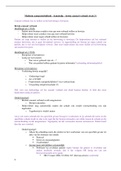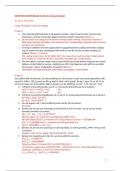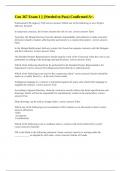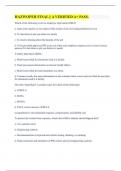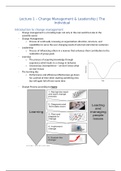Lecture notes Clinical psychology
Lecture 1 introduction and research
Literature: Davey: an introduction to psychopathology + research methods
General introduction / course information
8 chapters in Davey book → 7 lectures
4 chapters in Capita Selecta → 3 lectures
2 journal articles → 1 lecture
SlimStampen is optional, except if you will be taking the exam online.
Read the chapters related to each lecture.
History of clinical psychology
In the book:
- Psychopathology stems from theories of demonic possession (chapter 1)
- The biological model: psychopathology is a disease
- The development of psychopathology emerged from psychiatry:
The American psychiatric association – 1844
The American psychological association – 1892
→ experiments on how the brain works.
Shell shark is now called PTSD, this was shown after WOI. → no treatment for these
traumatic events at the time. → started the clinical field.
In WOII a lot of people that needed treatment for mental issues. → psychologists helped.
1947: APA committee on training in clinical psychology:
- Report on current programs
- Recommend new content
- Set-up standards: doctorate + clinical internship
1949: Boulder conference → Shakow report:
- Focus on ‘holy trinity’ of assessment, therapy, and research
- Clinical psychologists are scientist-practitioners
, 2
Clinical psychology today
Practical component → psychopathology = symptoms which may indicate a mental
disorder. This practical component can now, in the Netherlands, be practiced without
getting a doctorate.
Scientific component → psychopathology = academic study of (symptoms of) mental
disorders.
Research in clinical psychology
Why do clinical psychologists conduct research?
- To build theories on the development of disorders
- To design interventions based on those theories
- To evaluate the efficacy of these interventions
- To promote evidence-based practice
Theories are of importance when discussing clinical psychology.
Biopsychosocial model of psychopathology → different types of factors that causes:
Why then use a theory?
- Provides a framework for describing a phenomenon.
- Is based on data and hypotheses
- Presents a testable concept or idea → useful in research and clinical practice
- Makes predictions about people
Example: Dr. Mark Williams, an expert on depression and suicide.
Theory: memory influences depression
→ this patient has a memory problem → could this be the cause of his depression
he examined this with a case study
, 3
The benefits of this:
- May be an important source of new ideas
- Can challenge the assumptions of an existing theory
- Gives tentative evidence for a (new) theory
Limitations of this:
- Biased perception by only one observer
- Low internal validity (causality?)
- Low external validity (generalizability?)
Based on the case study → standardized test to look into the memory of depressed people:
Autobiographical memory test (AMT):
- Participants are presented with a series of cue-words
• 5 unpleasant
• 5 pleasant
- For each cue-word, they are asked to produce a specific memory
• Memory for a personally experienced event, tied to a certain place and time (<24
hours)
There is a strong positive correlation between scores on the depression questionnaire and
the proportion of overgeneral memories as measured on the AMT.
The studies conducted with this test is a correlational study.
Benefits of the correlational study:
- Solves problem of low external validity
- High replicability
- Use of statistics
Limitations:
- Does not solve the problem of low internal validity
• It does not give information about what causes the other and a third-variable
problem could be possible (confounders present).
Another type of study common in the field of clinical psychology is a case-control study.
Compare different type of diagnoses.
Benefits:
- Clinical very feasible
Limitations:
- Cross-sectional
- The third variable problem is not taken away
• Still correlational study
A prospective study tries to find events that cause depression.
Benefits:
- Longitudinal design: cause predates effect
Limitations:
- Clinically not very feasible
• Limited availability high-risk groups
- Third-variable problem remains
• Still correlational
• No group allocation
- There is no manipulation
, 4
A study development memory specificity training (MEST) (an example of an experimental
psychotherapy)
- A group of people with depression where administered the training
- After the training people recorded less overgeneral memory → their depression
symptoms went down.
The MEST was an intervention. The randomized controlled trail (RCT) is clinical experiment
involving a (new) treatment.
Benefits:
- Random group allocation to distinguish placebo effect
• “toss-of-a-coin principle”
- Possibility of blinding participants and/or researchers
• Prevents biases
Limitations:
- Un-blinding is common
- Placebo effect can be large
- Internal validity is relative
- Translation to clinical practice
Summary of the first part:
- Clinical psychology came into adulthood after WWII
- Most clinical psychology studies are correlational


